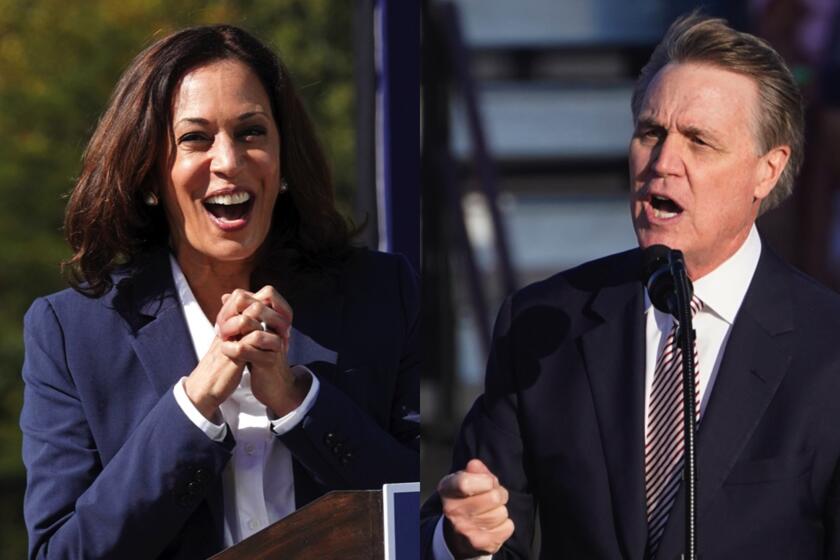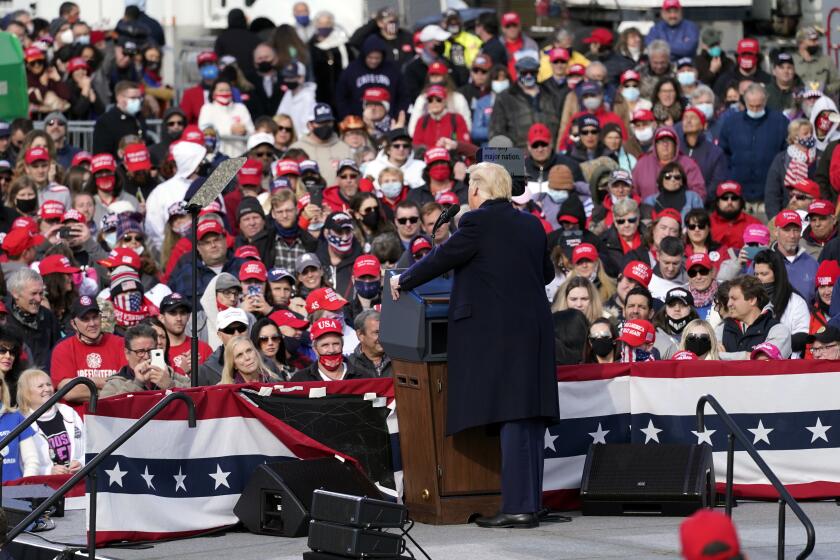Searching for women’s votes, Trump mixes insults with flattery
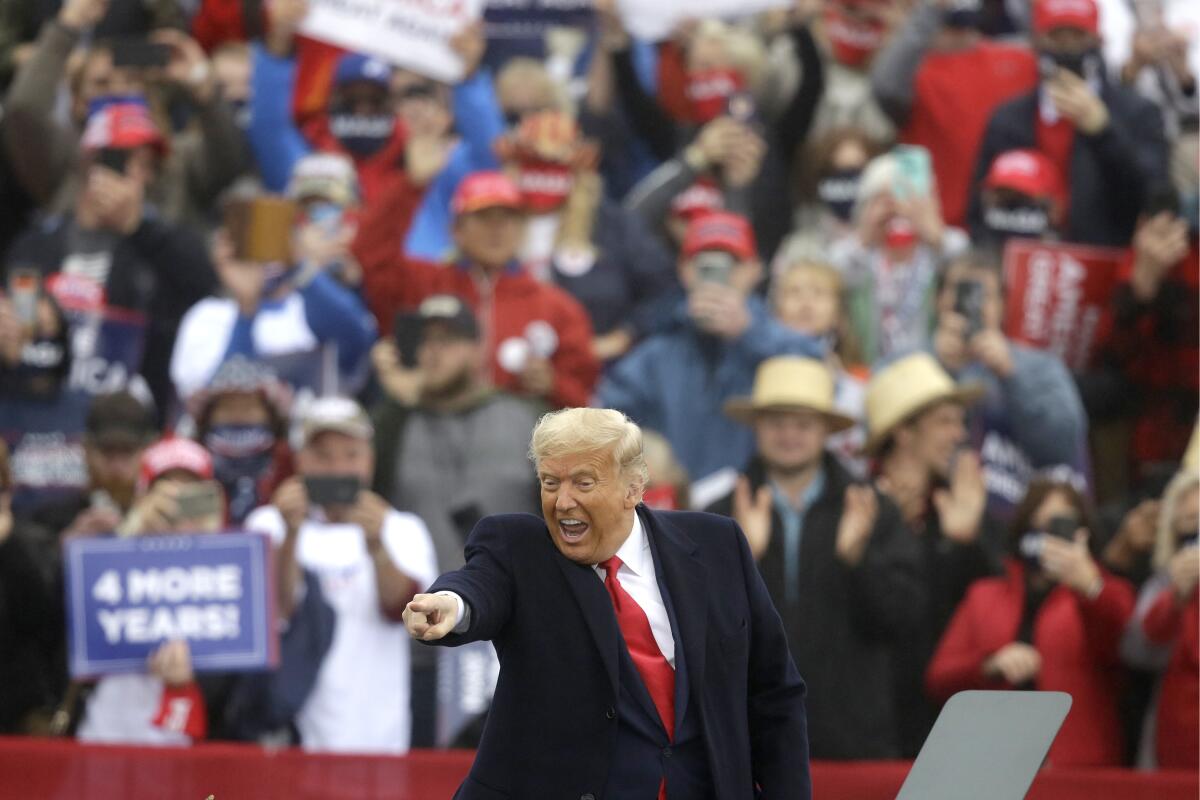
- Share via
WASHINGTON — President Trump added a new complaint about Sen. Kamala Harris, the Democratic nominee for vice president, on Monday — her laugh.
“Did you see her last night on television with the laugh?” he asked a crowd in Allentown, Pa. “Ha ha ha,” he said in a mocking mimic of the California senator’s voice.
As the presidential race moves into its final week, polls show Trump is trailing Democrat Joe Biden by double digits with women voters. But it hasn’t stopped the president from attacking, insulting and patronizing women he considers political enemies, or even just not supportive enough.
He insulted House Speaker Nancy Pelosi, a regular target of his derision, as “crazy as a bed bug” on Monday during nearly four hours of speeches during three rallies in Pennsylvania.
He has demanded that Michigan Gov. Gretchen Whitmer, a Democrat, show more gratitude because “my Justice Department” stopped an alleged domestic terrorism plot against her.
He complains that he is treated unfairly by female journalists, accusing NBC’s Savannah Guthrie of “going totally crazy” when she questioned him in a televised town hall. He walked out of a “60 Minutes” interview last week because he said CBS’s Lesley Stahl’s tone was “no way to talk.”
And in repeatedly disparaging Harris — even calling her a “monster” — and intentionally mispronouncing her first name, he has suggested that her gender might be as disqualifying as her politics.
“We’re not going to have a socialist president,” Trump said Friday in Florida, trying to discredit Harris. “Especially not a female socialist president.”
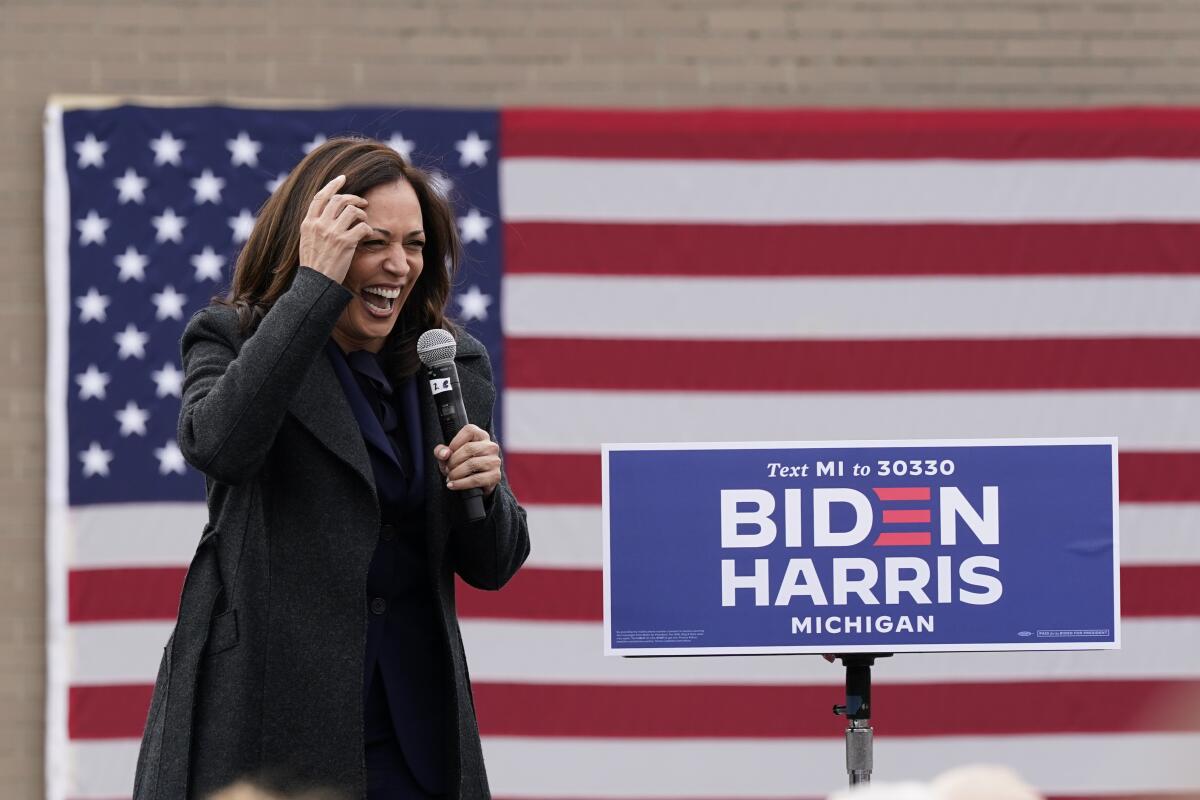
On the “60 Minutes” interview that aired Sunday, Harris burst out laughing and said “no” when Norah O’Donnell asked if she had a “socialist or progressive perspective.”
“It is the perspective of a woman who grew up a Black child in America, who was also a prosecutor, who also has a mother who arrived here at the age of 19 from India, who also likes hip hop,” Harris answered, still chuckling.
Trump clearly was bothered enough by her guffaws to return to the topic Monday. “Is there something wrong with her?” he asked. “She kept laughing.”
The gender gap is no laughing matter for Trump’s campaign, however. A majority of women voters have supported Democratic candidates for president in every election since 1988, and this year it appears to be widening significantly.
A senator mangled vice presidential nominee Kamala Harris’ name at a Trump rally. It wasn’t new for her, or for many more who’ve been made to feel “other.”
Four years ago, women preferred Hillary Clinton by a 12-point margin over Trump, according a Pew Research Center analysis of national exit polls. President Obama had a similar margin among women when he won the 2012 and 2008 elections.
Polls suggest Biden could swamp those margins. A survey conducted by NBC News and the Wall Street Journal this month showed the former vice president leading women by 60% to 34%, compared to his overall lead of 53% to 42%.
“Donald Trump has hit the the daily double when it comes to offending women voters — his behavior is incorrigible and his his policies are insensitive,” said Peter Hart, a Democratic pollster.
“The story of this election is going to be about women — that women were willing to take a chance on him in 2016 and after watching him govern for four years, they didn’t want him any more,” said Sarah Longwell, who founded Republican Voters Against Trump and has conducted focus groups with women who backed the president.
Many women were willing to ignore Trump’s behavior as long as the economy remained strong, Longwell said. Their support evaporated when the COVID-19 pandemic struck, the country plunged into a recession and normal life was upended.
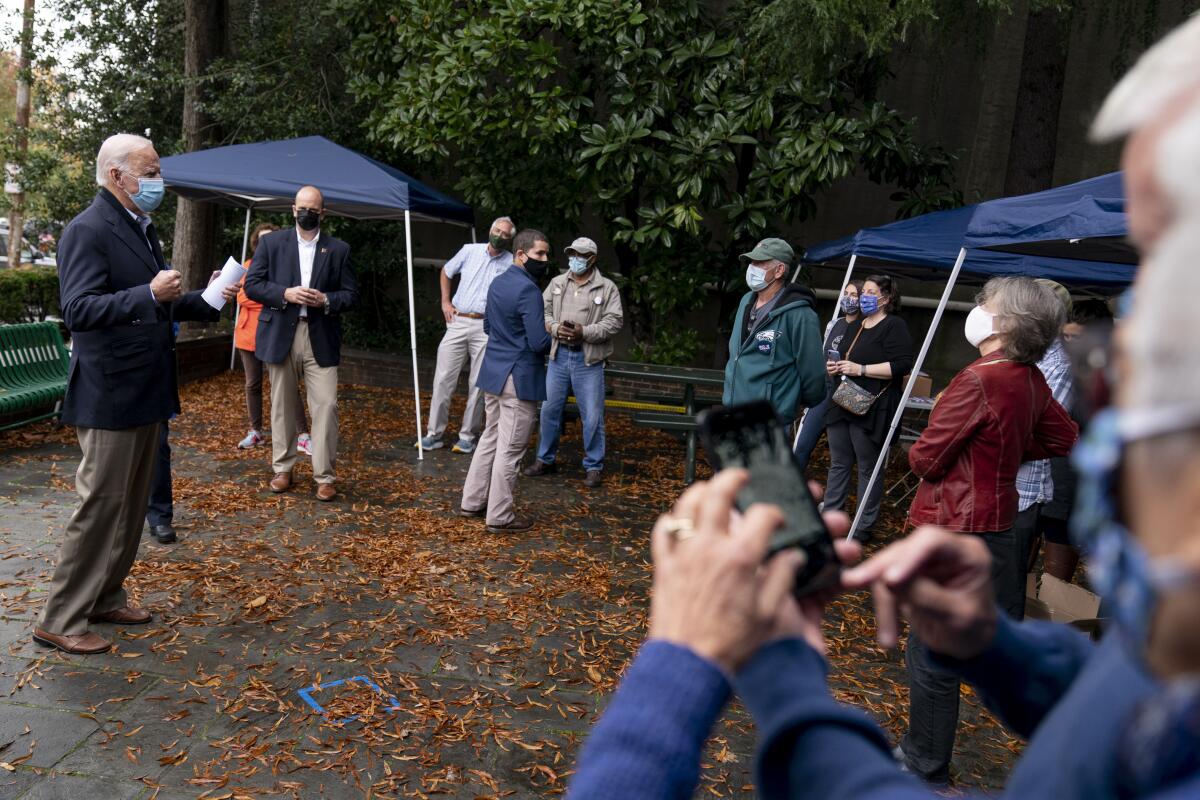
Biden also campaigned in Pennsylvania on Monday, stopping outside a voter service center in Chester, a Philadelphia suburb, where he criticized Trump’s handling of the pandemic, an issue that has dominated the final phase of the campaign as infections and hospitalizations have surged.
“We can, in fact, end this crisis,” Biden said.
For his part, Trump ignored the country’s growing COVID-19 death toll — now above 225,000 — as well as the second coronavirus outbreak at the White House less than a month after he was hospitalized for three days and nights with COVID-19.
Instead he bragged that he had recovered. “I got it, and I’m here, right?” Trump said at a rally in Lititz, Pa.
While Trump was staging multiple raucous rallies, Biden brushed off questions about his comparatively light campaign schedule, saying he will visit Georgia on Tuesday — a state that has not voted for a Democrat since 1992 — as well as Iowa, Wisconsin and Florida later this week.
Trump is on the defensive as Biden’s plans to campaign in Georgia and picks up the endorsement of New Hampshire’s most influential — and conservative — newspaper
Biden has spoken on virtual get-out-the-vote events from his home in Wilmington. Del., and has dispatched high-profile surrogates to stump for him in battleground states, but is holding his lead by often staying out of sight for days at a time.
Although polls have tightened, Biden leads Trump in the so-called “blue wall” states of Pennsylvania, Wisconsin and Michigan, three states that Trump won in 2016.
“The blue wall has to be reestablished,” Biden said. If he succeeds, Trump would need to take a state that went to Democrats four years ago, an unlikely prospect at this point.
At his rallies, Trump’s appeals to women sometimes sound like pleading, although he has said he just joking when he begs for their support.
“Please, please, suburban women. You should love me,” he said Friday in The Villages, Fla.
He has tried to bring suburban women — sometimes he calls them “housewives” — back to his side by making a pitch for what he calls “law and order” and claiming that he protected their neighborhoods from low-income housing by eliminating an Obama-era regulation.
On Monday, he said suburban women are “great” and they “want two things.”
“They don’t want a five-story project next door,” he said. Second, “they don’t want to have antifa and anarchists running through their streets.”
Longwell said the message isn’t resonating, especially after voters were repelled by Trump’s response to mostly peaceful protests over the police killing of George Floyd, a Black man in Minneapolis, on May 25.
“That was when the bottom fell out with women,” Longwell said.
Harris called Trump’s insults “predictable” in an interview with ABC’s “The View” on Monday.
“I mean it’s childish, it’s name-calling on behalf of the president of the United States, and, again, the American people deserve so much more from their president,” she said. “You know, look, the name-calling is not new to me — it’s not new to anybody who played on the playground as a child. But this is not the playground.”
More to Read
Get the L.A. Times Politics newsletter
Deeply reported insights into legislation, politics and policy from Sacramento, Washington and beyond. In your inbox three times per week.
You may occasionally receive promotional content from the Los Angeles Times.
